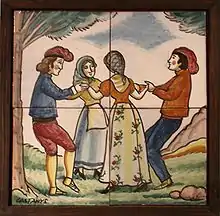La Santa Espina
La Santa Espina (Catalan pronunciation: [lə səntəs'pinə]; The Holy Thorn) is a sardana composed by Enric Morera with lyrics written by Àngel Guimerà. It is the most emblematic of all sardanas[1] and is considered a patriotic hymn by the Catalans.[2][3][4]
| "La Santa Espina" | |
|---|---|
 | |
| Song by Enric Morera i Viura | |
| Language | Catalan |
| English title | The Holy Thorn |
| Released | 1907 |
| Genre | Sardana |
| Songwriter(s) | Àngel Guimerà |
It was premiered in 1907 in the Teatre Principal of Barcelona as part of a zarzuela of the same name and nowadays is usually performed as the final piece in many cobla concerts.[5] Because of its Catalanist connotacions La Santa Espina was prohibited during the dictatorships of Primo de Rivera (1923–1930) and Francisco Franco (1939–1975), when also the Catalan national anthem Els Segadors was forbidden.[1][5]
Lyrics
| Original text | English translation |
|---|---|
Som i serem gent catalana |
We are and we shall be the Catalan people |
Recorded versions
La Santa Espina was first recorded in 1907 by the cobla La Principal de Peralada and is always included in all recording compilations of the best and most popular sardana songs. Due to its popularity and symbolic relevance, it has been also performed by many musicians other than classic sardana bands.[5]
One of these alternative versions is the jazzy cover by Charlie Haden and Carla Bley in the famous Liberation Music Orchestra's album The Ballad of the Fallen (1983).[6] More recently, it has been also interpreted in different styles by Catalan artists like Marina Rossell[7] and Toti Soler.[3]
References
- "La Santa Espina, interpreted in its entirety by the Orquestra Simfònica del Vallès | Barcelona Cultura". www.barcelona.cat. Ajuntament de Barcelona. 11 March 2014. Retrieved 2023-05-11.
- "Jesús Ventura: 'Durant molts anys 'La Santa Espina' va ser un succedani d'himne nacional'" [For many years ‘La Santa Espina’ was a substitute national anthem]. VilaWeb (in Catalan). 2014-03-15. Retrieved 2023-05-11.
- Gómez-Font, Àlex (2022-07-05). "Toti Soler: 'La santa espina és el veritable himne de Catalunya'" [La Santa Espina is the real anthem of Catalonia]. Núvol (in Catalan). Retrieved 2023-05-11.
- Laurent, Marta. "Famous Catalan Songs That Will Touch Your Soul". ForeverBarcelona. Retrieved 2023-05-11.
- Subirana, Lluís (2007). "Centenari de La Santa Espina" [Centenary of La Santa Espina] (PDF). Quadern de les idees, les arts i les lletres (in Catalan). Fundació Ars (159): 25. eISSN 2385-4979.
- "Charlie Haden & the Liberation Music Orchestra – The Ballad of the Fallen". AllMusic. Retrieved 2023-05-11.
- "Marina Rossell – Cap Al Cel". AllMusic. Retrieved 2023-05-11.
External links
- "La Santa Espina at Palau de la Música by the Agrupació Polifònica de Vilafranca" (video). YouTube. 2015-12-03. Retrieved 2023-05-11.
- "La Santa Espina by Marina Rossell at Gran Teatre del Liceu" (video). YouTube. 2014-01-18. Retrieved 2023-05-11.
- "La Santa Espina by Dansaires del Penedès in the Provincial Government of Tarragona on the occasion of its centenary" (video). YouTube. 2008-03-19. Retrieved 2023-05-11.
- "La Santa Espina by La Principal de la Bisbal (videoclip)" (video). YouTube. 2017-01-04. Retrieved 2023-05-11.